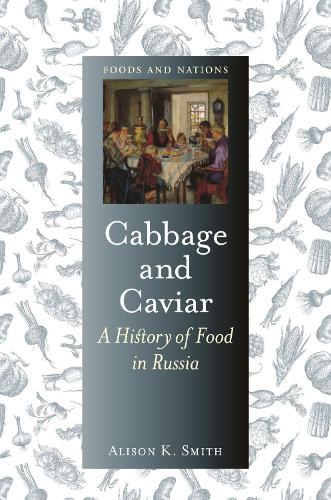
Cabbage and Caviar: A History of Food in Russia
(Hardback)
Publishing Details
Cabbage and Caviar: A History of Food in Russia
By (Author) Alison K. Smith
Reaktion Books
Reaktion Books
15th August 2021
United Kingdom
Classifications
General
Non Fiction
Cultural studies: food and society
641.300947
Physical Properties
Hardback
352
Width 156mm, Height 234mm
Description
When people think of Russian food they generally think either of opulent luxury, signified above all by caviar, or of poverty and hunger of cabbage and potatoes and porridge. Both of these visions have a basis in reality, but both of them are incomplete.
The history of food and drink in Russia includes hunger and it includes plenty, it includes scarcity and, for some, at least, abundance. It includes dishes that came out of the northern, forested regions and ones that incorporate foods from the wider Russian Empire and later from the Soviet Union. Cabbage and Caviar places Russian food and drink in the context of Russian history, and shows off the incredible (and largely unknown) variety of Russian food.
Reviews
At a moment when Russian cuisine is ascendantwith critically acclaimed restaurants, celebrity chefs, and popular cookbooksthere is no better guide to its thousand-year history than Smiths Cabbage and Caviar. In a book that is both erudite and accessible, Smith again shows herself to be one of the worlds foremost scholars of Russian food and drink. -- Stephen V. Bittner, author of Whites and Reds: A History of Wine in the Lands of Tsar and Commissar
Smith's overview of Russia's food history, spanning several centuries, will be useful to readers encountering this topic for the first time, as well as culinary historians interested in the evolution of Russian cuisine. -- Sharon Hudgins, author of T-Bone Whacks and Caviar Snacks: Cooking with Two Texans in Siberia and the Russian Far East
A sumptuous survey of twelve centuries of Russian history through the prism of food, Cabbage and Caviar offers up a brilliant account of eating, drinking, and food producing through the ages. With her analysis of the worlds of princes, peasants, townsfolk, and commissars, Smith shows how foodways both blurred and reinforced social distinctions, whether in in times of aspirational plenty or of tragic famine. A feast for the eyes as well as the culinary imagination, Smiths book treats us to mouth-watering recipes and a vivid appreciation for the richness and diversity of Russias everyday life. -- Diane P. Koenker, Director and Professor of Russian and Soviet History, University College London
Author Bio
Alison K. Smith is Professor and Chair of the Department of History at the University of Toronto. She is the author of Recipes for Russia: Food and Nationhood under the Tsars (2008) and For the Common Good and Their Own Well-Being: Social Estates in Imperial Russia (2014).
